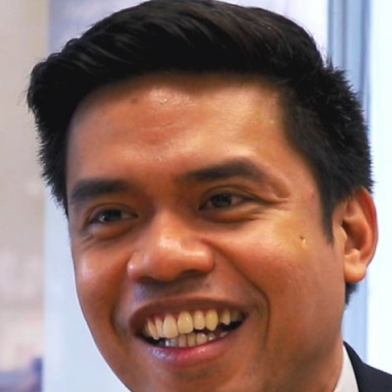What’s your view on President Rodrigo Duterte’s first year in office?
I’d describe the first year as “action-packed”. President Duterte didn’t waste time; many things have been enforced or implemented – this includes the war on drugs. Security issues have been addressed, in the sense that plans have been laid, [and] the economic agenda has been activated.
What are Filipinos at home and overseas concerned about?
The top issues would be peace and security. Filipinos in the homeland want a thriving economy and a stable income, but they know this can only happen in an atmosphere of stability and peace, and where the laws are enforced. This is where the [interests of] overseas Filipinos overlap with those in the country. Overseas Filipinos are normally deployed in more mature democracies where there’s peace, order and relative security – therefore they want relatives back home to experience the opportunities that have been open to them.

Rodrigo Duterte received overwhelming support at the polls.
Is Duterte a democratic leader?
We can assess whether Duterte is a democratic president in two ways. He is democratic by way of mandate – he did not cheat his way to becoming president. That’s clear. People overwhelmingly voted him into office.
Now, if we view democracy in a more maximal sense – that it’s not only procedural in the way of electing leaders, but also substantive, where we’re focussing on ideas related to human rights, transparency, accountability, and the rule of law – there is a perception Duterte is not as aggressive about protecting rights, as he is about addressing criminality and peace and order.
To what extent he is able to substantially improve the quality of democracy in the Philippines remains an open-ended question. His lack of attention to human rights, his somehow even scathing disregard for it at certain points in his pronouncements, is troubling – particularly to those who view that democracy should be more about human rights rather than the mandate of the people.
What’s your perspective on how Duterte is covered by international media?
There’s a disjunct between how the foreign press ... have defined what the over-riding issues are, [and what] ordinary Filipinos feel. There’s a lot of negative perceptions. But if you take out the smoke, you have a country whose investment confidence has remained. Business confidence remains high because the Duterte government has addressed critical issues of insecurity, as well as put in place more spending on infrastructure, more investments in building roads, airports and the necessary logistics to maintain growth. There’s not a lot of reporting on those aspects. There needs to be more diligent, comprehensive reporting on what's going on in the Philippines, and not simply on what is low-hanging fruit.
What is the Philippines’ role in the Asia-Pacific?
What the Philippines has done in terms of fostering international relations is it’s become more accommodating of the different powers in the region. The fact that Duterte did not just visit major powers [in his first year of office], but also medium and small powers including its ASEAN neighbours, is indicative of his resolve to develop closer bonds with countries in the Asia-Pacific. I think what the Philippines is trying to do is craft a foreign policy that signals it is open to fostering cooperation on mutual interests with countries, regardless of their position in the regional strategic environment.

To what extent he is able to substantially improve the quality of democracy in the Philippines remains an open-ended question, says Dr Aries Arugay.
What is New Zealand’s role in the Asia-Pacific?
New Zealand is a dialogue partner of ASEAN. The Philippines sees the value of countries like New Zealand, which can pose as a middle power in the Asia-Pacific. In periods of relative uncertainty and strategic unpredictability in the region, there’s a role to be played by non-threatening, credible powers. New Zealand could play that moderate voice – a voice that doesn’t take a high premium on geopolitics and the use of force to realise domestic interests ... [A voice that] reminds countries to stay calm, to resolve disputes in a way that unites our interests rather than divides us.
Why is the Philippine-New Zealand relationship important?
The Philippines is a country of 100 million people. For the New Zealand economy that’s a big market. So it’s important for New Zealand to foster relations with the Philippines because of investments made in the Philippines by New Zealand companies.
Apart from this, the New Zealand government also conducts its foreign policy in a way that promotes certain norms such as democracy and human rights. So [there’s potential for New Zealand to] foster some form of soft power, people-to-people exchanges on shared ideas or principles such as democracy, human rights, or the rule of law and good governance.
The bonds between the two countries are also fostered by the large Filipino migrant community in New Zealand. Given the increasing number of Philippine migrants in New Zealand, the relationship will have to be developed to become deeper.


